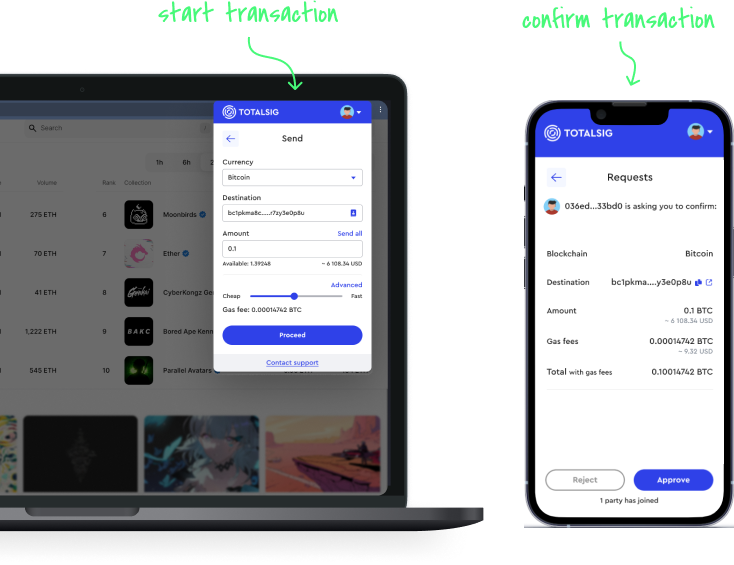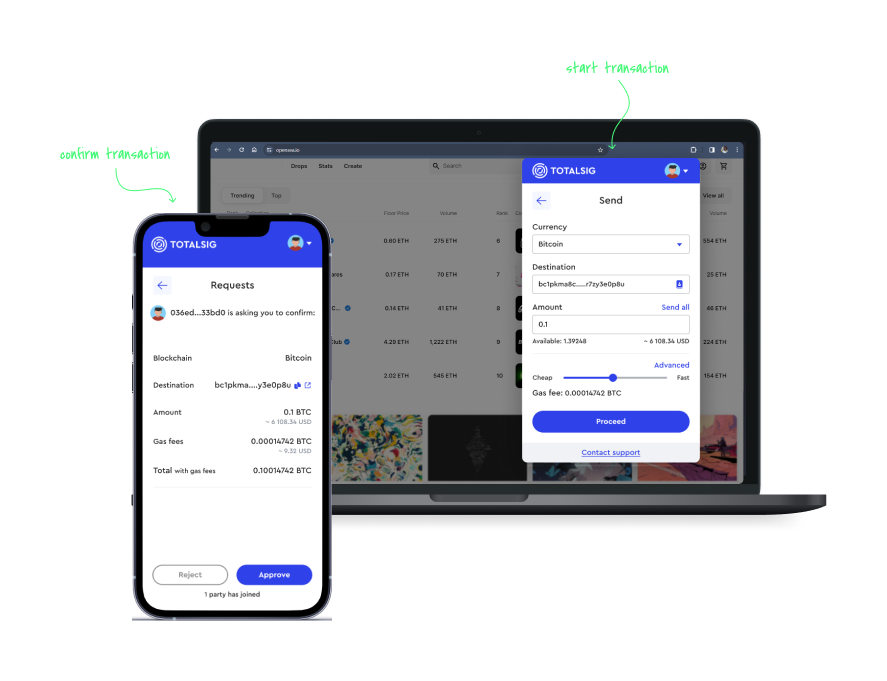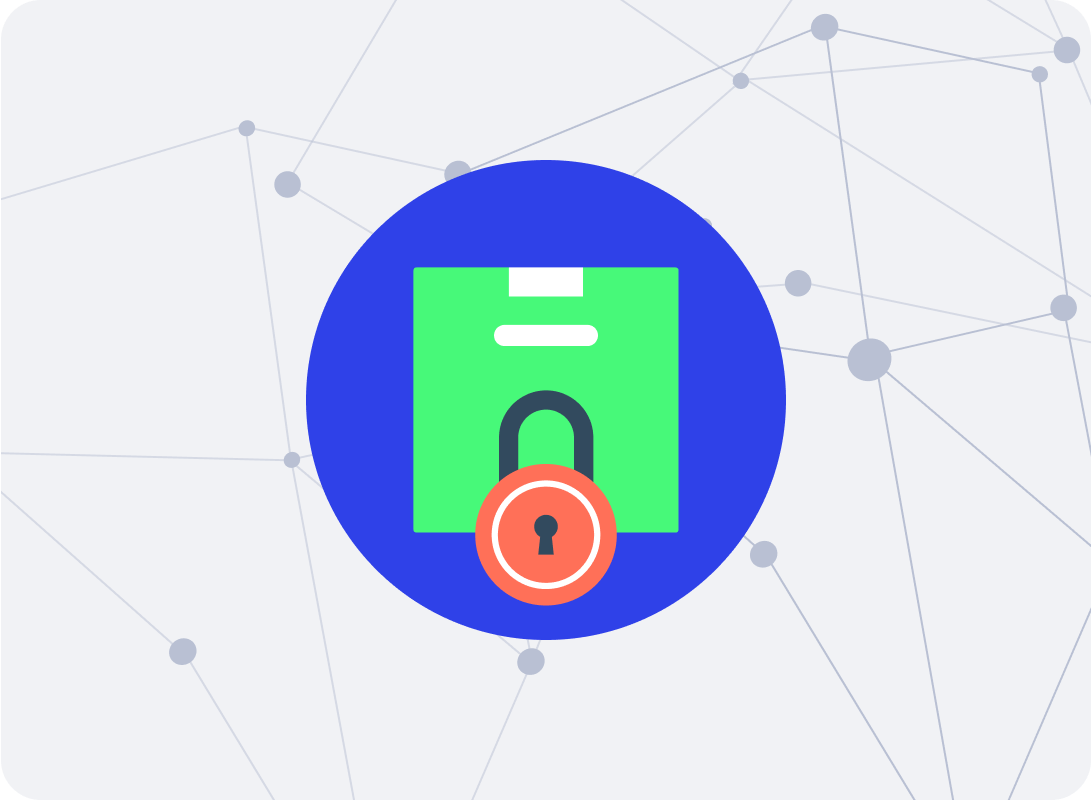TotalSig makes managing Bitcoin multisigs simple and easy. There's no need to spend hours searching for new solutions and grappling with complex processes when you can achieve it with just one click. Bitcoin multisigs are finally here, enhancing your team's business operations with security and convenience.
Download Wallet

How to Use Bitcoin MultiSig
Bitcoin MultiSig Fees
Operation costs
TotalSig
1.76 USD 43%!
Other multisigs
3.07 USD
Totalsig reduces operational costs by eliminating the need for complex P2SH wallet scripts. Previously available only to large institutional players, Totalsig now makes MPC technology accessible to everyone.
Why There is Price Difference?
Unlike other solutions that rely on smart contracts, which are known for their complexity and high costs, TotalSig utilizes MPC multisigs. This innovative approach is increasingly adopted by leading institutional players, offering a significant reduction in multisig expenses and improving the user experience.
On the Bitcoin network, MPC multisigs are more cost-effective compared to traditional P2SH multisigs. This is because they require only one signature per input, which avoids the need for multiple signatures that typically incur higher network fees. This streamlined approach not only reduces costs but also simplifies transaction processing on the Bitcoin blockchain.
Why Use MultiSig Wallet

Increased Security
Traditional wallets rely on a single access point, which, if breached, leaves funds vulnerable. Multisig wallets elevate security, necessitating multiple private keys for transactions. A fortified barrier, it substantially reduces the chances of unauthorized access and fund theft.

Risk Mitigation
In traditional single-key systems, if a key holder is unavailable, it can disrupt operations. Multisig addresses this risk. With multiple key holders, transactions proceed without delay, ensuring smooth business operation.

Shared Ownership
In instances where assets need collective decision-making, multisig wallets shine. By distributing control among several parties, it mandates consensus for transactions, ensuring that no single entity holds unilateral power, fostering collaboration and mutual trust.

Decentralized Organizations
Embracing the ethos of decentralization, multisig wallets cater perfectly to decentralized autonomous organizations (DAOs). With no central authority, these wallets empower collective management, ensuring that decisions and transactions echo the shared values and visions of its members.
Wallet Features
Free multisig wallets
TotalSig is a comprehensive multisig wallet designed to enhance the security of your digital assets. It supports BTC, the principal cryptocurrency of the Bitcoin network, offering robust protection for your transactions and holdings.

Best fee calculator
TotalSig provides a premium fee calculator designed to ensure you pay the least possible fees. Unlike other wallets that might place a lower priority on fee optimization, leading to possible overpayments by two to three times, TotalSig prioritizes cost efficiency, especially beneficial for Bitcoin transactions.


About Bitcoin
What is Bitcoin?
Bitcoin is a decentralized digital currency, introduced in 2009 by an entity under the pseudonym Satoshi Nakamoto. As the first cryptocurrency, Bitcoin paved the way for a myriad of other digital currencies. It operates on a peer-to-peer network, where transactions are verified by network nodes and recorded on a public ledger called a blockchain.
Bitcoin ecosystem
Background
Bitcoin was created as an alternative to traditional currencies and a means to effectuate transactions without reliance on centralized financial institutions. Officially released in 2009, it has remained the most prominent cryptocurrency, emphasizing the concept of decentralized financial sovereignty.
Purpose
The primary purpose of Bitcoin is to enable secure, private transactions across a decentralized network. This system offers an escape from governmental oversight and financial institution control, promoting monetary independence and privacy.
Coins
Bitcoin is not only a unit of currency but also a means of transferring value across the Bitcoin network. The network's security is maintained through a proof-of-work consensus algorithm, which also serves to release new bitcoins into circulation at a predictable rate.
Types of Bitcoin wallets
Choosing the ideal Bitcoin wallet involves weighing various options tailored to different preferences for security, convenience, or both. Each type offers unique features and caters to specific needs.
Hardware wallet
Hardware wallets are the pinnacle of security within the Bitcoin storage options. These physical devices store Bitcoin's private keys offline, protecting them from online threats. Transactions require the device to be connected physically to a computer or smartphone, which ensures a secure yet user-friendly transaction process, typically secured by a pin or password.
Although offering enhanced security, hardware wallets also come with issues of cost and convenience. The need to connect the device physically for transactions may be inconvenient for users who need frequent access to their assets. Additionally, the price of these devices can vary, possibly making them less accessible to some individuals.
Web wallet
Web wallets offer the highest level of convenience in the Bitcoin wallet ecosystem, accessible via browser extensions or websites. They simplify the setup process to just creating an account and setting a pin, ideal for users who prioritize ease of access and frequent transactions. However, the inherent online nature of these wallets makes them more vulnerable to cyber-attacks.
The centralized storage of keys on servers can be particularly risky, and users of custodial web wallets, which manage private keys on the user's behalf, must be wary of security risks.
Desktop wallets
Desktop wallets strike a balance between accessibility and security, installed as software on the user’s own computer. They store private keys on the device, providing a secure environment when the computer is offline, similar to hardware wallets. Yet, the necessity for an internet connection to perform transactions introduces potential vulnerabilities, such as exposure to viruses or targeted hacks.
Despite these risks, desktop wallets can be highly secure when used properly—keeping the computer offline except for necessary transactions. Examples of such wallets include Bitcoin Core and Electrum, which demonstrate how desktop wallets can combine robust security with user-friendly interfaces.
Frequently Asked Questions
Simply donwload the app an follow the onboarding process to create or connect your wallets.
MPC (Multi-Party Computation) multisig wallets utilize cryptographic protocols to enable multiple parties to collaboratively create and manage private keys without ever sharing the complete key. This allows for secure transaction signing without exposing sensitive information.
Our platform utilizes MPC multisig and advanced security features to protect your assets.
We support multiple blockchains including: Bitcoin BTC, Ethereum ETH, Tron TRX, Solana SOL, Litecoin LTC, BNB Smart Chain BNB, Tether USDT, Dai token DAI, NFT NFT, Polygon MATIC, Arbitrum ARB, Avalanche AVAX, Bitcoin Cash BCH, Dogecoin DOGE, Optimism OP. See full list of supported coins and tokens here